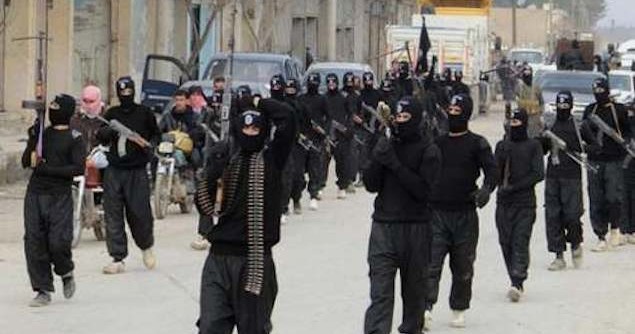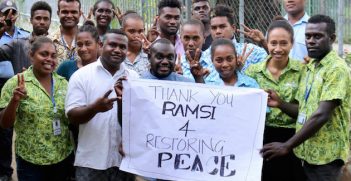The Islamic State: A Geopolitical Analysis

As the initial shock of the Islamic State (IS) dissipates, Joshua Brown provides insight on where and how these events came to be, and importantly, how this changes western engagement with the region.
As an Al-Qaeda affiliate that rose to notoriety during the Syrian conflict, the rise of IS has taken the world by surprise. Their rapid growth and expansion centres on the creation of an independent Islamic caliphate that spans over areas of Syria, Iraq and Jordan. Although such an aim is not new, IS is a force to be reckoned with in the region. The organisation alone is estimated to be worth $US2 billion; giving it the title of the world’s wealthiest terrorist organisation. This threat posed by IS has been further magnified by its ability to hold and defend the ground it has conquered.
Interestingly, a core aspect of this movement’s Salafi ideology is its belief in temporal closeness with their prophet Muhammad. Adherents of the wider Salafi movement are known to reject associations with anything considered outside of seventh century Islam. It is this rejection of modern paradigms that gives sharia law precedence in the eyes of IS. This simple concept of temporal association though can often be seen to justify popular political resentments formed through historical interference from outside. Such manipulation of resentments through ideology is shared with other groups such as Al-Qaeda and the Muslim Brotherhood, though interestingly both have now publicly disavowed further connections with IS.
Following their geo-strategic gains, the high levels of cruelty and violence perpetrated by IS against their enemies indicate a strong ideological force behind the supporters of the organisation. Actions include such things as mass executions, crucifixion, and torture that ultimately leave little room for local dissent. These factors share many similarities with listed terrorist organisations around the world inasmuch as ideologies are able to serve a dual purpose. One is a manipulation into a legitimising force through which cruelty and violence can manifest itself, which in turn leads to strategic gains through the use of fear to suppress dissent in the short term.
However, the ease with which IS has expanded through Iraq owes a large part to the resentment held by the Sunni minority towards Shia strongman Nouri al-Maliki, the former prime minister named this week as one of the country’s three vice-presidents. This resentment has been the product of poor policies and political choices that have led many to believe that he is manipulating the political system for personal gains at the expense of the Sunni minorities. Accusations include distorted representation of the budget, disproportionate targeting of Sunni ‘terrorists’ and political enemies, and high levels of micromanagement of and favouritism in the Iraqi military. This resentment within the Sunni communities has allowed IS to incite sentiments of victimisation, as well as notions of cultural redemption. Hence, this has, at the least, resulted in large scale apathy towards the organisation’s expansion and, more worryingly, brutal forms of fanaticism in their supporters. Although the crisis is not specifically the result of the Sunni-Shia split, it seems as if Maliki is trying to take advantage of it by mobilising his Shia allies. If he is successful, the implications are broad for the region.
Further complicating matters is the fundamental role of identity in this dispute, in the wake of IS’s rapid advancements. Addressing this, however, is proving very difficult for outside countries including Australia. Already, the Australian public is faced with reports of fly-in jihadists from their homeland, the UK and elsewhere. What is clear is that bad local governance on behalf of Maliki has flared up a residual security crisis left from the Iraq War. The Iranian response to the situation seems evidence of this. Sending its top level security advisers to aid their Shia ally in Bagdad – to a region that it has traditionally been at odds with – Iran hopes to extend its regional influence to Iraq. This is alongside claims by Maliki that IS is secretly being funded by the Gulf States, suggesting vested interests from the south that run contrary to Iran’s wishes.
Amongst the turmoil, the Kurdish Peshmerga have also managed to solidify long held territorial claims. Ironically, while this directly challenges the territorial holdings of IS; this move also complicates Turkish and Iranian positions and influences in the area, with both now being forced into tentative negotiations with the minority group. All of this comes on top of what many in the Middle East see as the US’s neglect of responsibilities to stabilise the region after the Iraq invasion. This perfect storm scenario has left outside countries with few options beyond the usual ‘wait and see’.
It is becoming increasingly clear that IS represents a game changer for the west in the region. It is unlikely that those who suffer the consequences of this turmoil will forget the perceived inaction of the great powers; even as the US directs limited air support in Iraq. The fact that this is a regional as opposed to a national crisis will make sure of this. Amongst the bloodshed, however, is the possibility that by remaining militarily outside of the conflict, Australia and the rest of the Western world are forcing themselves out of the picture.
In such a situation, the best option for the West is to try and accommodate the humanitarian crisis, be it through aid, shelter, or diplomacy. In the long run, the story of IS is likely to involve regional powers like Iran, Saudi Arabia and Turkey, rather than images of western imperialism. Unfortunately though, it is unlikely that the US will be able to shake off its perceived guilt in regards to the Iraq war.
Joshua Brown is currently an intern with the AIIA Tasmania branch. He is now in his final year of a combined undergraduate degree with majors in Economic Analysis and International Relations.





